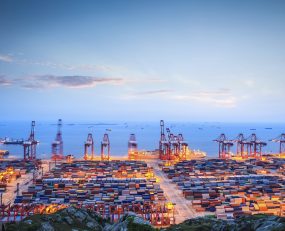
It appears that Hong Kong-based Kerry Logistics is to invest in the construction of a new container terminal and logistics hub on the Black Sea.
The precise details are not clear in the statements issued, however Kerry commented that it “today (4/7/18) announced the signing of a memorandum of understanding…to cooperate in the development of the Anaklia Deep Sea Port (‘Anaklia Port’) and Special Economic Zone (‘Anaklia SEZ’) in Anaklia, Georgia”. The size of any investment was not stated.
Its partner is the Georgian regional authority that owns the port, which in turn is in a partnership with the American civil engineering company, Conti International, and port terminal operator, SSA Marine. The project has been looking for capital for several years.
It may be the case that Kerry has agreed to help in the funding of the port, possibly by focussing on the development of warehousing and land-side freight transport. Certainly Kerry described its objective as “devising innovative solutions to facilitate the building of Anaklia Port into a successful logistics hub for the region with integrated logistics, sea-rail, and sea-road services.” The port has already made a start on the building of the core container terminal.
What is clear is that Kerry is intent on building a forwarding network in Central Asia and the Middle East. The deal with Anaklia is being done through Kerry’s recently acquired Globalink, a Dubai based forwarder. Whether this will include physical assets and of what type is unclear, however Kerry already has a reasonable portfolio of warehouses in China and South East Asia.
Edwardo Erni, the Managing Director of Kerry Logistics in China and North Asia, commented that he saw Anaklia as “a key cargo gateway in the Caucasian region”. However, the real importance of this investment will be ability to exploit its potential on the routes between Europe and China. The large scale multi-modal infrastructure is already more-or-less in place, with new roads and railways built between the Georgian ports, Caspian ports and the Central Asian approaches to China. What is now needed is the development of service provision. If this is effective it will pose strong competition for the only just emerging Chinese dominated ‘Asian-Europe Landbridge’ via Russia and Kazakhstan.
Source: Ti